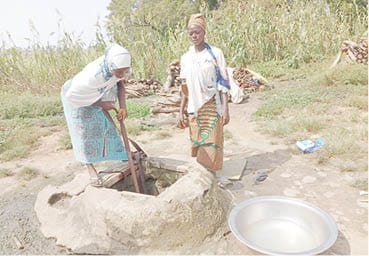Bwaje, an agrarian settlement tucked inside Gurdi Ward of Abaji Area Council in the Federal Capital Territory (FCT), sits quietly on the edge of modern Abuja, yet lives as though untouched by the city’s development.
For more than a century, the community has existed without basic amenities many Nigerians consider foundational.
According to the traditional ruler, HRH Aliyu Isah, Bwaje has never benefited from government intervention at either the FCT or area council level.
No school, no health centre, no access road, no borehole, and not even a polling unit. To access any public facility, residents must travel to neighbouring villages.
With a population of over 2,300 people — including Fulani, Hausa dry-season farmers, and other indigenous groups — the community grapples daily with challenges that mirror the hardship of rural life in pre-independence Nigeria.
When Abuja Metro visited, women were seen drawing water from the only well in the village, a structure residents dug themselves last year.
Before then, residents relied solely on the Gurara River—nearly two kilometres away.
The chief said water scarcity is only one layer of the crisis. Without a school building, children take lessons inside the village mosque.
He noted that parents have been forced to enroll their children in a primary school in Gurdi, a difficult two-kilometre journey made worse during the rainy season when flooding makes the river impassable.
Health emergencies, he said, often turn tragic. With no health facility in Bwaje, patients rely on motorcycles to reach Gurdi for treatment.
The community recently lost two pregnant women who died before they could reach the health centre across the river.
Road access into Bwaje paints an equally grim picture. There are no culverts or bridges across the streams leading into the village, making transport nearly impossible for farmers who move produce to markets in Yaba and Abaji.
During the visit, the poor condition of the narrow paths and the absence of any engineered road were clearly visible.
Over the years, the community has also been denied a polling unit. On election days, residents travel to Gurdi to cast their votes — a journey HRH Isah said reinforces feelings of abandonment.
He added that politicians often visit during campaign seasons to make promises that disappear after ballots are counted.
He appealed to the Abaji Area Council chairman to provide Bwaje with essential amenities, including a borehole, a health centre, a primary school, proper road access, and a bridge linking the community to its neighbours.
Responding, the Chief of Staff to the council chairman, Mohammed Kandi, said the council had directed its Works Department to assess the community’s needs for inclusion in next year’s budget.
He added that the chairman had recently visited Bwaje during campaign rounds and promised to address the issues raised.
Despite these assurances, residents remain cautiously hopeful. For a community that has waited over 100 years, visible government presence — not promises — is what they long for.
Source: Daily Trust



